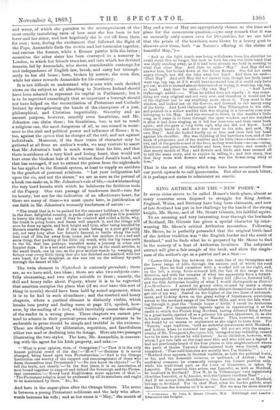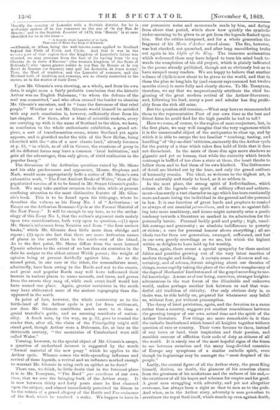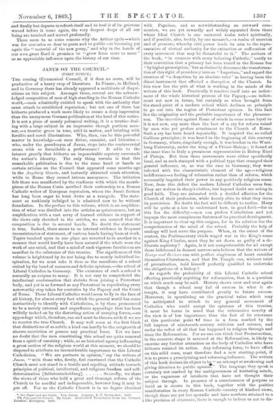KING ARTHUR AND THE "NEW POESY."
IF seven cities strove to be called Homer's birth-place, almost as many countries seem disposed to struggle for King Arthur. England, Wales, and Brittany have long been claimants, and now of late Scotland has put in her challenge by the hands of the strong knight, Mr. Skene, and of Mr. Stuart Glennie, his faithful squire.
To an amusing and very interesting tour through the lowlands of Scotland, Mr. Gleunie has given a special character by inter- weaving Mr. Skene's critical Arthurian researches. Following Mr. Skene, he is perfectly persuaded that the original birth-land of the Arthur tradition was "the English border and the south of Scotland," and he finds what he is prepared by Mr. Skene to find in the scenery of a host of Arthurian localities. The subjoined extract will give a fair sample of the book, and show the single- ness of the author's eye as a patriot and as a Scot
"Lower Glen Isla lies between the main line of the Grampians and the lower range of hills, through the eastern end of which the road passes. Here we find ourselves with a wooded hill on the right, and, on the left, a steep, furze-covered hill, the last of the range in this direction, and with the remains of what has apparently been a formid- able stronghold on its summit. It is Barry-hill (Barra, fortified hill), and the first Arthurian locality of what I would distinguish as District 1.—Strathmore. I ascend its grassy sides, crossed by many a sheep track, and eta sorry its rabbit inhabitants disturb themselves so much to get out of my way. Seated on the higher of the two lines of entrench- ment, and looking down on the great valley of Strathmore, stretching across to the seaward range of the Sidlaw Hills, and with the Isle wind- ing through it, past the bonnie house o' Airlie,' I recall its Arthurian traditions. For innumerable legends agree in representing it as the castle to which the Pictish king Mordred, having defeated King Arthur in a great battle, carried off as a prisoner his queen Quenivere, or, as she is locally named, Ganora, Vanora, or Wander. This, however, it seems, she found by no means so unpleasant as she ought to have done. For ' Vanora,' says tradition, held an unlawful intercourse with Mordred ; and Arthur, when he received her again,' did not act with the magna- nimity of Mr. Tennyson'sflosregum, but, 'enraged at her infidelity, caused her to be torn to pieces by wild horses.' As an old fellow, however, with whom I got into talk on the road near this, and who told me a legend I had not previously heard of the four places in this neighbourhood where the parts of Queen Vanora's dismembered body were buried, sagely remarked : Thee auld histories are maistly lees, I'm thinkin.'" . . . "Mordred thus appears, in Scottish tradition, as both the political hostis, or foe, and the domestic inimicus, or unfriend, of Arthur ; but in modheval romance he commonly occupies the former position only, while his traditional part, as the lover of Guenivere, is taken by Lancelot. The question then arises, can Lancelot, as well as Mordred, be localized in Scotland? Now 31. do Is Villemarqud very ingeniously identifies Lancelot, or L'Ancelot, with the Cymric chieftain 31ael." . . . . And if we accept this identification, then Lancelot, as well as Mordred, belongs to Scotland. For 'le chef 31ael, salon lee bardes gallois, avait dans rEcosse des domains oft il la mona.' But we may far more directly • Arthuriana. By John S. Stuart Ulennie, M.A. .Edinburgh and London : Edmonston and Douglas. identified for us in the lines—
—Albanak, or Alban, being the well-known name applied to Scotland Forth and Clyde. And that it in was but checked, not quenched, and after long smouldering broke beyond the Firth of was the
el.storn pArt, of that region that the kingdom of Lancelot's father was out again in his Idylls of the King. The immense acclamation situated, we may presume from the fact of its having been 'le roy which welcomed these may have helped to turn his mind back to- Claudas de la terre d'Escosse ' (the western kingdom of the Scots of wards the completion of his old project, which is plainly indicated DAlriada?) who 'mane guerre contra Is roy Ban de Benoic et le roy
in the poems already published, though not so obviously but as to Boon t de Ganues (or Gannet° taut quit lea desherita de bears terree
Thus, the Mael of tradition, and the Lancelot of romance, and the have escaped many readers. We are happy to believe that another liordred both of tradition and romance, are as closely connected in the volume of idylls is now about to be given to the world, and that in scenes, as in the stories of their lives." them the plan so long lain by (and rumour says resumed but twelve
Upon Mr. Glennie's own showing, as a whole, and from his own months since) is more fully and clearly shown. To Air. Tennyson, data, it might seem a fairly probable conclusion that the historic therefore, we say that we unquestionably attribute the chief be- Arthur was an English Woman, " to whom the defence of the ginning of the great modern revival of the Arthur-literature; wall was committed," and who often crossed the border to chastise and, following his lead, many a poet and scholar has dug profit- Mr. Glennie's ancestors, and to " tame the fierceness of that rebel ably from the rich old mine.
people." Whether or not Mr. Glennie would himself be satisfied But the question still remains,—What may have so recommended with any such conclusion is, however, sufficiently clear from his them to the representative Poet of our own time as the best and last chapter. For there, after a blaze of scientific rockets, every fittest form he could find for the high parable he had to tell ?
one carrying up with it the name of Scotland to the skies, we have, Here we come, of course, to the region of mere conjecture, but, in as conclusion to the whole enthusiastic exhibition, a grand set- the first place, we may well imagine that the very vagueness which piece, a sort of transformation-scene, where Scotland yet again it is the unsuccessful object of the antiquaries to clear up, and by appears, and is glorified under the title of the New Hellas, being which it is able to escape the too familiar " touching, tasting, and identified with the " site of a new classic land," already foreseen handling" of 'dry-as-dust' criticism, eminently fits the Arthur cycle at p. 15, " in which, as of old in Greece, the creations of poesy in for the poetry of a time which takes firm hold of little that it does all its different forms may have a common local habitation,' and not disenchant. In the mists of those dim ages move shadows so gain all the advantages, thus only given, of vivid realization in the gigantic and yet so human, that while the curiosity which breeds popular fancy." contempt is baffled of too close a stare at them, the heart throbs to The discussion of the Arthurian questions raised by Mr. Skene follow them and to feel them of its own kindred. The littlenesses and his able predecessors and opponents, Messrs. Stephens and of detail are blotted out by the haze, and only the grand outlines Nash, would more appropriately befit a notice of Mr. Skene's own of humanity remain. The ideal, so welcome to the highest art, is .exhaustive work, " The Four Ancient Books of Wales," than of the found naturally and ready to hand, as it so seldom is.
popularized version of it to be found in Mr. Stuart Glennie's guide- In the next place, the strong spirit of Individualism, which book. We may take another occasion to do this, while at present colours all the legends—the spirit of solitary effort and achieve- confining attention to the most distinctive feature of Mr. Glen- ment—has surely a vast charm for an age which has been continually nie's book. This is to be found upon his title-page, where he more and more losing the individual in the general and the personal describes the volume as his Essay No. 1 of " Arthuriana : or in law. It is one function of great bards and prophets to remind Essays on the Arthurian Romance-Cycle as the Formal Material of us always of our essential personalness, and to warn us against fall- the New Poesy." It will be enough to say here, as to the arches- ing into mere machinery, and hence might naturally arise a poetic ology of this Essay No. 1, that the author's argument rests mainly tendency towards a literature so marked in its admiration for the upon two considerations, both very open to question,—(1) upon personally heroic. Personal bodily peril and purity ; high, unsel- Mr. Skene's inferences from Nennius and from "the four ancient fish courage and generosity ; an absolute indifference to poverty books," which Mr. Glennie does little more than abridge and or riches ; a care for personal honour above everything ; all are repeat ; (2) upon the fact that there are more Arthurian names ideals too far from our generation, swamped, suffocated, and lost of places in the north than in the south-west of the island, in our own greedy crowdings as we are, but which the highest As to the first point, Mr. Skene differs from the most learned within us delights to have held up for worship.
Cymric scholars to the extent of no less than six centuries in the Then, again, there seems a special sympathy for these ancient date he assigns to the oldest extant Welsh poems ; the weight of fables and parables growing out of the very latest reaction of opinion being at present decidedly against him. As to the modern thought and feeling. A certain sense of dimness and un- second point, in one case or the other, the nomenclature must, certainty, and of solemn, devout misgiving about our theories of admittedly, have been owing to the Bards and not to the events, things, seems rapidly taking the place of the shallow complacency of and great and popular Bards may well have influenced their the days of Mechanics' Institutes and of the gospel according to use- hearers in various places to name mounds, and tarns, and groves fal knowledge. A sense as of our being, ourselves, stranger knights- from the events they sang of, while each event itself would but adventurous in the vast forest of the illimitable and unknown tave named one place. Again, greater mutations in the south world, makes perhaps another link between us and that won- anay have obliterated more of the ancient topography than die- derful old tradition of chivalry. Our only obvious duty is, as
appeared in the north, theirs was, to ride boldly on, prepared for whatsoever may befall In point of fact, however, the whole controversy as to the us, without fear, yet without presumption.
birth-land of the Arthur cycle is yet far from settlement, The decay of local patriotism, again, and the devotion to a cause nor does Mr. Glennie contribute much more to it than a rather than a country, suggests yet another resemblance between genial traveller's guide, and an amusing manifesto of nation- the growing temper of our own actual time and the spirit of the ality. A frank note, by the way, on p. 32, goes to remind the Arthur literature. Few things are more remarkable in it than reader that, after all, the claim of the Principality might still the catholic brotherhood which bound all knights together without stand good, though Arthur were a Dalesman, for, as late as the question of race or country. Their vows became to them, instead thirteenth century, "the mountains of Cumberland were still of any town or land, their inspiration and their passion, and
called Wales." unselfish succour of affliction their code of duty as citizens of all Turning, however, to the special object of Mr. Glennie's essays, the world. It is surely one of the most hopeful signs of the times a question of undoubted interest is suggested by the words to see between ourselves and the many long-divided countries -" formal material of the new poesy" which he applies to the of Europe any symptoms of a similar catholic spirit, even Arthur cycle. Whence comes the wide-spreading influence and though its beginnings may be amongst the "most despised of the revival of these legends, a revival and an influence marked enough people."
to warrant Mr. Glennie in using such an epithet as he does? Lastly, the central figure of all the Arthur story, the great King There can, we think, be little doubt that in the foremost place himself, derives, no doubt, the glamour of his ceaseless charm it is to Mr. Tennyson, "The Bard" par excellence of our own from the greatness of his misfortune and the sadness of his end,— thee, that we owe the bringing-back of the Arthur story. It the overthrow of all his hopes and schemes for empire and for good. is now between thirty and forty years since he first chanced A great man struggling with adversity, and yet not altogether upon the subject, and almost immediately perceived its fitness to overcome, has always been a sight as dear to men as to the gods. be the vehicle of a grand allegory of the Battle and Pre-eminence And when, as in the Arthur story, adversity is seen powerless to of the Soul, which he resolved o make. We happen to have in overthrow the royal Soul itself, which stands up even against death, under-meani ng to be given to or got from the legends flashed upon
"' A knycht clepit Lancelot of ye Laik, him. But the critics interposed, and for a whole generation the That sone of Bane was king of Albanak,' fragment of his Morte d'Arthur stood alone. The fire, however,
and finally but departs to refresh itself and to heal it of its grievous wound before it come again, the very deepest deeps of all our being are touched and moved profoundly.
These seem to us some reasons why the Arthur cycle—which was for centuries so dear to poets and to public —is becoming yet again the "material of the new poesy," and why in the hands of our own great Bard it promisas to "grow from more to more" as an appreciable influence upon the history of our time.
































 Previous page
Previous page